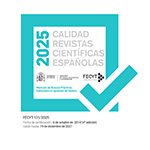The Spanish ‘Popuchik’: A Secret Episode in the Life of Ángel del Río, Celebrated Cervantes Scholar, 1926-1927
Abstract
Among the Bolshevik leadership during the first two decades of Soviet rule, the term popuchik, from the Russian for “fellow traveler”, was used to identify bourgeois communist sympathizers, whose ideological commitment was considered too weak to be trusted. This article contributes a summary of a secret episode in the life of Ángel del Río, outstanding professor of Columbia University, as popuchik of the communist party of Spain and possible carrier for the communist internationalist movement during several years in the 1920’s. The data concerning del Río’s secret life was recovered in the personal archive of a U.S. communist agent by the name of James N. Sager, recently discovered in the Manuscript and Archives Division of the New York Public Library. Despite the apparently inconsequential significance of del Río’s brief collaboration in the radical network of the Communist International or Comintern (1919-1943) in the Americas, the story serves as an example of the unexpected and unpredictable historical nooks and crannies that the subject of international communism can offer beyond the structured ideological and political histories of the Comintern’s golden years as a global phenomenon. Under the alias “Leandro Cabrera,” del Río would act as co-founder of the Communist League of Puerto Rico, the first communist organization in the island in 1926. The case of this well-known scholar’s secret life as a communist agent provides an interesting and hardly considered angle in the history of the interaction between Russia, Spain and the Americas, as it suggests a transnational exchange between members of the Iberian radical enclave and the American hemisphere long before the Spanish Civil War opened the way for this sort of historical interaction.Downloads
Article download
License
In order to support the global exchange of knowledge, the journal Cuadernos de Historia Contemporánea is allowing unrestricted access to its content as from its publication in this electronic edition, and as such it is an open-access journal. The originals published in this journal are the property of the Complutense University of Madrid and any reproduction thereof in full or in part must cite the source. All content is distributed under a Creative Commons Attribution 4.0 use and distribution licence (CC BY 4.0). This circumstance must be expressly stated in these terms where necessary. You can view the summary and the complete legal text of the licence.











